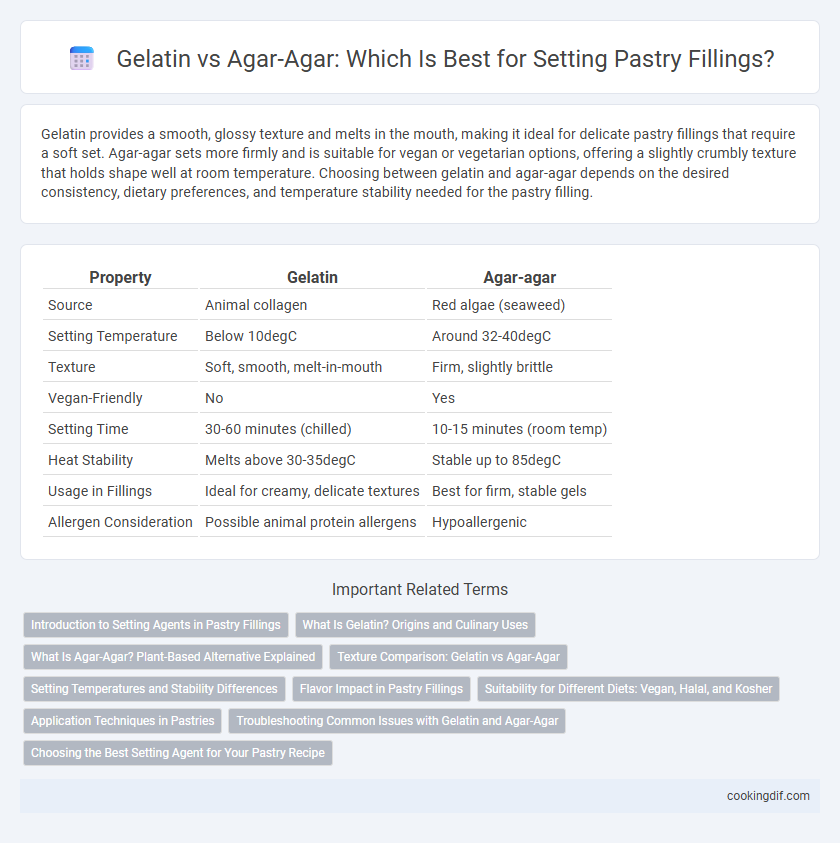Gelatin provides a smooth, glossy texture and melts in the mouth, making it ideal for delicate pastry fillings that require a soft set. Agar-agar sets more firmly and is suitable for vegan or vegetarian options, offering a slightly crumbly texture that holds shape well at room temperature. Choosing between gelatin and agar-agar depends on the desired consistency, dietary preferences, and temperature stability needed for the pastry filling.
Table of Comparison
| Property | Gelatin | Agar-agar |
|---|---|---|
| Source | Animal collagen | Red algae (seaweed) |
| Setting Temperature | Below 10degC | Around 32-40degC |
| Texture | Soft, smooth, melt-in-mouth | Firm, slightly brittle |
| Vegan-Friendly | No | Yes |
| Setting Time | 30-60 minutes (chilled) | 10-15 minutes (room temp) |
| Heat Stability | Melts above 30-35degC | Stable up to 85degC |
| Usage in Fillings | Ideal for creamy, delicate textures | Best for firm, stable gels |
| Allergen Consideration | Possible animal protein allergens | Hypoallergenic |
Introduction to Setting Agents in Pastry Fillings
Gelatin and agar-agar are popular setting agents used in pastry fillings to achieve smooth, stable textures. Gelatin, a protein derived from animal collagen, melts smoothly at body temperature, creating a soft, melt-in-the-mouth consistency ideal for mousse and panna cotta. Agar-agar, a plant-based polysaccharide extracted from seaweed, sets more firmly and withstands higher temperatures, making it suitable for vegan desserts and fillings requiring a more resilient texture.
What Is Gelatin? Origins and Culinary Uses
Gelatin, a translucent, flavorless substance derived from collagen found in animal bones and skin, is widely used in pastry fillings for its smooth texture and reliable setting properties. Originating from ancient methods of boiling animal parts to extract collagen, gelatin has become a staple in culinary applications such as mousses, jellies, and custards for its ability to create a delicate yet firm consistency. Its superior melt-in-the-mouth quality makes gelatin preferable over plant-based alternatives like agar-agar in recipes requiring a tender, creamy finish.
What Is Agar-Agar? Plant-Based Alternative Explained
Agar-agar is a natural, plant-based gelling agent derived from red seaweed, commonly used as a vegan alternative to gelatin in pastry fillings. It sets more firmly and at higher temperatures than gelatin, making it ideal for stable, glossy fillings that remain solid even at room temperature. Unlike gelatin, agar-agar provides a clear, firm texture without refrigeration, offering pastry chefs a reliable option for plant-based desserts and fillings.
Texture Comparison: Gelatin vs Agar-Agar
Gelatin produces a smooth, creamy texture with a delicate, melt-in-the-mouth consistency ideal for mousses and custard-like fillings. Agar-agar sets firmer and more brittle, creating a slightly jelly-like texture that holds shape well but lacks gelatin's elasticity. Pastry chefs choose gelatin for softness and agar-agar for a more rigid, vegan-friendly set.
Setting Temperatures and Stability Differences
Gelatin sets at temperatures between 15degC and 25degC, creating a smooth, flexible texture ideal for delicate pastry fillings, but it melts at body temperature, which can cause fillings to soften quickly. Agar-agar sets at a higher temperature, around 35degC to 40degC, and provides a firmer, more heat-stable gel that remains solid at room temperature and resists melting in warm conditions. The thermal stability of agar-agar makes it preferable for pastries requiring long shelf life or exposure to heat, whereas gelatin offers a silkier mouthfeel suitable for chilled desserts.
Flavor Impact in Pastry Fillings
Gelatin provides a neutral taste that preserves the original flavor profile of pastry fillings, making it ideal for delicate desserts where flavor clarity is essential. Agar-agar often imparts a slight vegetal or seaweed aftertaste, which can subtly influence the overall flavor of the filling, especially in light or fruity pastries. Bakers choose gelatin for its clean flavor impact and agar-agar when a firmer texture is prioritized despite its minor effect on taste.
Suitability for Different Diets: Vegan, Halal, and Kosher
Gelatin is derived from animal collagen, making it unsuitable for vegan diets and uncertain for halal and kosher certifications unless specifically sourced and certified. Agar-agar, a plant-based seaweed extract, is vegan-friendly and inherently halal and kosher, appealing to a wider range of dietary restrictions. Pastry fillings requiring firm, stable textures can benefit from agar-agar's robust gelling properties without compromising on religious or ethical dietary requirements.
Application Techniques in Pastries
Gelatin provides a smooth, transparent gel ideal for delicate pastry fillings like mousses and creams, requiring careful blooming in cold water and gentle heating to dissolve without losing firmness. Agar-agar sets more firmly and withstands higher temperatures, making it suitable for fruit-based or vegan fillings, but it must be boiled to activate its gelling properties and sets quickly when cooled. Understanding the precise temperatures and setting times for each ensures optimal texture and stability in layered pastries and filled desserts.
Troubleshooting Common Issues with Gelatin and Agar-Agar
Gelatin often causes common issues like uneven setting or weeping in pastry fillings due to incorrect blooming or overheating, which breaks its protein structure. Agar-agar, while more heat-stable and suitable for vegetarian options, can result in brittle or overly firm textures if not properly dissolved and set at the right temperature. Adjusting gelatin bloom time or agar concentration and ensuring precise temperature control are key steps for perfect fillings in pastries.
Choosing the Best Setting Agent for Your Pastry Recipe
Gelatin and agar-agar serve as key setting agents in pastry fillings, each with distinct properties shaping texture and stability. Gelatin, derived from animal collagen, provides a smooth, melt-in-the-mouth texture optimal for creamy, delicate fillings but requires refrigeration to set effectively. Agar-agar, a plant-based polysaccharide from seaweed, sets firmly at room temperature, offering a vegan alternative with a slightly firmer, jelly-like consistency suitable for stable, shelf-friendly pastries.
Gelatin vs Agar-agar for setting fillings Infographic

 cookingdif.com
cookingdif.com